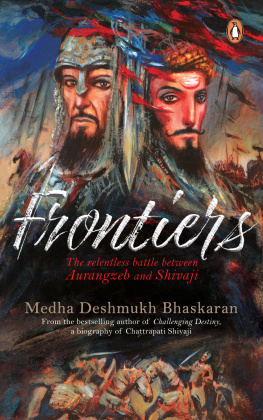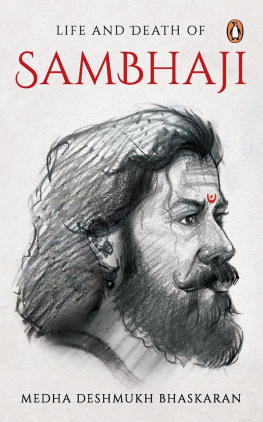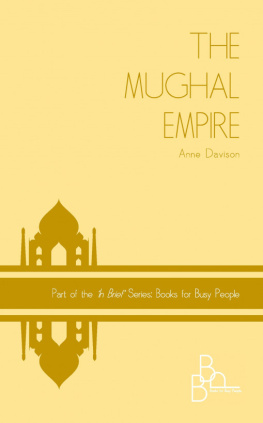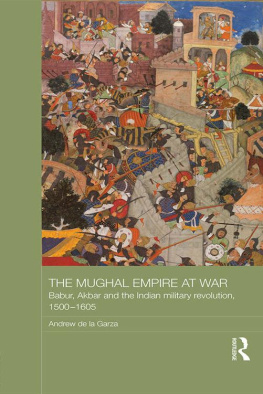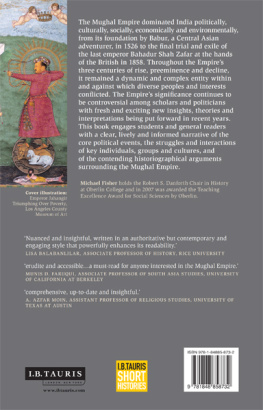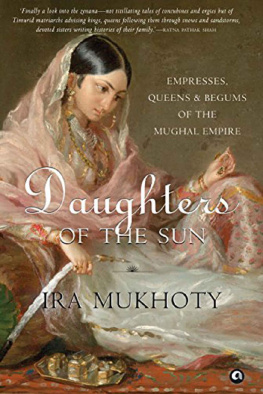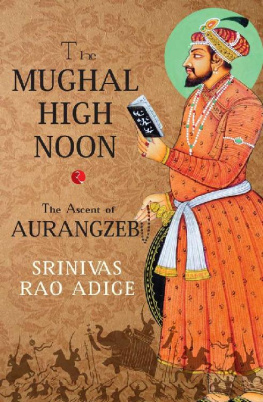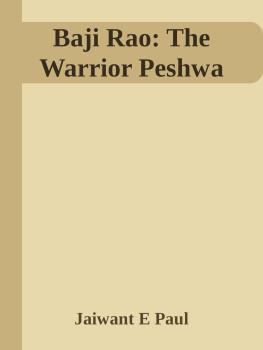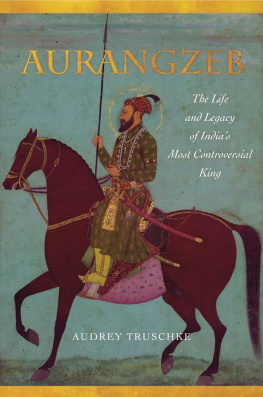Medha Deshmukh Bhaskaran is a microbiologist and has worked for food and pharmaceutical companies in marketing as well as business development in countries like Germany, India and the United Arab Emirates. From a young age, she has dabbled in poetry in Marathi and English. She has written articles on a variety of subjects for leading newspapers in India as well as in the Gulf. She is the author of Shivajis bestselling biography, Challenging Destiny. Her book on the world of pharmaceuticals and medicines, Prescription of Life, was published in May 2018. Now a full-time writer, she enjoys long walks, cooking and farming for leisure. Frontiers is her first work of fiction.
Introduction
Seventeenth century AD was a turbulent period for the Indian subcontinent. Powerful Hindu kings had turned into vassals of the rapidly growing Mughal empire in the north. The south, or the Deccan, had its own despotic Hindu landlords working for the powerful Muslim kings whose ancestors had long ago arrived from Central Asia and beyond. Coastal Deccan was teeming with European sea traders with high political aspirations, growing fast in their strength and influence due to their technological prowess.
It was during this time that Shivaji Bhosale was born. The son of a jagirdar, he was expected to follow in the footsteps of his forefathers and become a nobleman in the court of Adil Shah, as a jagirdar or a landholder. The path laid out for him was easyto live luxuriously, maintain a well-equipped and strong cavalry, occasionally fight wars and earn grand titles. But when Shivaji looked around him, he saw a world riddled with cruelty, religious conflicts and mindless carnage, the noblemen blind with greed and immorality, the people enslaved, helpless and defeated, and spurned the life he was born into. He picked up his sword and chose to fight for his peoples freedom, for a free Maratha nationthe Hindavi Swaraj. Shivajis dream would soon darken under the shadows of swords and shatter under the heels of the armies of the Mughal empire. Witness the chronicling of momentous intrigues and battles, victories and defeats, triumphs and heartbreaks that sent thunderbolts across the centuries.
Shivajis dream to free his people was seen as a challenge to Islam, a power that spanned half the globe and was knocking on the doors of Europe. They called him a rebel, a bandit, a guerrilla, a mountain rat. Soon enough, Shivaji and Aurangzebs histories would get entangled with each other. Shivajis overarching vision made him great and unstoppable. Armies and cannons cannot still such storms.
But who was Shivaji really? Was he a petty bandit or a brilliant general? Was he merely a power-hungry man or a luminous visionary? Was he really the founder of a new era or is he just a footnote in the numerous pages of history? Shivaji is regarded as a philosopher king by some and a robber baron by some others. In the state of Maharashtra, he is akin to God. My research took me through so many pages of Shivajis life that I realized that the young India does not really know one of its greatest ancestors. In this historical fiction which is based on a true story, I have called him just Shivaji, without any prefix or suffix since the story starts when he was barely out of his teens. The purpose is to show him to people who always wonder who Chhatrapati Shivaji Maharaj really was.
During my research I came across a foreword written by Narhar Kurundkar for a famous Marathi novel by Ranjit Desai on Shivaji, called Shriman Yogi. Kurundkar strongly held that a portrayal of Shivaji could only be completed by showing not just who he was but also who he was up againsthis enemies, big and small. And so was formed the idea for this book, and its second protagonistAurangzeb. It is based on history but is fiction nevertheless because fiction allowed me the space to take all I had learned over the course of eighteen years and recreate what would have happened, what they would have said, how they would have fought.
Aurangzeb, who goes on to become the Mughal emperor bathing Hindustan in blood in this historical fiction was and has remained one of the most inscrutable men in Indian history. Was he just a jihadist or a supreme war strategist? How did the men of power in Agra plot against him? Why were some Mughal noblemen afraid that Emperor Shah Jahans first son, Dara Shikoh, would become the next emperor? What compelled Aurangzeb to embrace ideologies and philosophies of his perception of Islam? Was he a senseless aggressor or a literary genius who expressed his philosophies through his poignant poetry? What was his vision and mission? Did he have the power to crush the heart and soul of the Indian subcontinent? Was he just a mindless murdererof his brothers, of Hindus and of anyone who dared to challenge his beliefs?
Shivajis war was fought on a much bigger platform than a mere religious conflict. It was a clash of visions, a battle for the inner being of the Indian subcontinent. His unshakeable faith in the inherent decency of humankind is a thread that runs through his life and connects his disparate actions.
History looks different in different books. It was a monumental task to study the history of seventeenth-century India. I visited forts, pored over maps and exchanged ideas with the authors of some books that I have used as references. I do believe I am not the sole custodian of this task of telling this story. During my journey, I met some very dedicated people and without their help it would not have been possible to write this story, but I have persevered with all my heart and soul and hope that I have been able to recreate a bit, if not all, of what once had been.
The English translations of the Persian and Arabic poetry of Shah Jahan and Aurangzeb have been taken from various books by Sir Jadunath Sarkar. I have tweaked some lines of these. The English translations of poetry written by Marathi saint poets are mine.
PROLOGUE
1648
A chalky moon floats in the inky sky above the huge rock of Kandakada rising above the slopes of Purandar Hill. Shivaji Bhosale narrows his eyes to peer down the cliff. The darkness at the base of the mountain is broken by the distant glow of torches. The Adilshahi sultanates cavalry squadron has arrived from the east to reach the northern side of the hill. Shivaji knows that their commander, Fatte Khan, is seething with rage. It is quite likely that khan will send his men, two thousand as per the scouts estimate, up the hill. But Shivaji is not worried. The sultanates heavily armed cavalrymen are not trained to scale even small hillocks. And upon this hill, where even agile horses used to moving across hilly paths are rendered useless, the enemy will be forced to come up on foot.

